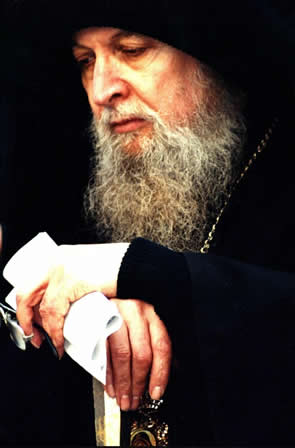Our Changing Paradigms:
 |
 |
 |
![]()
OUTLINE FOR A "TEACH-IN" ON ECOLOGY FOR 18 JULY 2007:
BY: Archbishop Lazar Puhalo
THE EARTH IS THE LORD'S AND THE FULNESS THEREOF
During the Age of Enlightenment and the Industrial Revolution, there developed first a notion and then a theology of man's dominance over and ownership of the earth. Even the creation narrative was re-interpreted as giving man a purely utilitarian ownership of the earth. While this desire to dominate the earth pre-dates these two extraordinary developments in human society, it had previously been necessary only to accommodate oneself to a certain amount of control, such as irrigation. It was these two events, one on the level of the mind and the other on the level of our action, that made it possible for us to carry out such domination.
Nevertheless, in the Law we are taught that all the land belonged to God and that portions were divided among the tribes to be held in trust and used for their needs, and as the embodiment of their responsibility to cultivate their ability to respond, like the Lord, with care. (***). God even went so far as to give a sabbath to the land, so that it might be rested and resuscitated (***). From this it is clear that God cares for the earth and desires that it be sustained. It is equally clear that the earth does not belong to us, rather we belong to it. Not only are we an integral part of the eco-system, but at the end of our lives the earth will reclaim us and return us to her bosom. God made us from the dust of the earth and established an important principle, for He also breathed into us the spirit of life. We are, therefore, both of Heaven and of earth. In a manner of speaking, we share in the image of the two natures of Jesus Christ, and so are invited to cultivate the sanctification of our incarnate way of being.
"Because the creation itself also shall be delivered from bondage to corruption into the glorious freedom of the children of God" (Rom. 8:21).
Apostle Paul tells us that all of creation fell together with man, and that it has been redeemed together with man. This is obviously a great mystery, for here he says that there is an intimate bond between man and the rest of creation. The purpose of man is not simply to worship God but to serve as a point of unity for all that exists. Man alone consists in the spiritual, the material and the intellectual, and he is therefore a microcosm of the whole universe - both the visible and the invisible. We have the capacity through our worship to serve creation as God loves creation. Ortho-doxa is more than just "right worship;" it indicates also the correct understanding of worship. Such ortho-doxa - right worship with a correct understanding - makes it possible for us to serve creation with blessing and healing. There is no relationship with our Lord and Saviour where there is not blessing but cursing, there is no cultivation but only a stripping away (a kind of spiritual strip mining), no healing but only harm. Man should have fulfilled this vocation as a unifying element in nature, for he is not only its crown, but the microcosm of creation. This vocation could only have been fulfilled through unselfish love and the absence of egotism. This would have constituted a proper use of his energies. The fall really constitutes a proclivity to habitually misuse our energies, not the loss of them. Christ healed this misuse through His perfect humanity, in whom the perfect human nature is expressed, making unity with God and the cosmos once again possible for human beings - a unity which Christ realized for us in His unity of perfect humanity with complete divinity. Human nature, restored in Him, has now the ability to make the proper use of its energies. This proper use is manifested in the Church - His Body - even if the members of the Church so often fall short of it. Understanding this is necessary in order for us to understand the complexities of the Incarnation of God. Jesus Christ as Incarnate recapitulated our nature and became the new Adam in order to correct our failures, complete our calling, fulfil our purpose and therefore deliver not only us, but the whole cosmos from bondage to corruption.
In the beginning - in the creation - man fit into the eco-system in a perfect balance. Had he truly acquired the knowledge of good and evil as a gift from God in the fulness of time, he could have maintained that balance. Having accepted from Satan a counterfeit of that knowledge, man's relationship with the cosmos also became counterfeit. The fact that the human race has come so close to destroying the eco-system upon which its own life depends makes it clear that humanity has misunderstood not only its own Being, but its relationship with the earth, with the universe, with God, and even with itself. These misunderstandings, not forming ourselves on that which is foundational to creation - the Creator's love and affection - always come hand in hand. We misunderstand both our own being and creation, including the whole of the universe, and God in one and the same act. This set of misunderstandings, born of a self-centred egotism, is a major aspect of what Christ came to earth in order to heal. It is important to remember that self centred egotism is not something most people are able to see and to understand about themselves, but it is deeply embedded in their whole way of putting their understanding of the world together. It is a fundamental misrepresentation of self, world and God and the only way we can untie this knot is by coming to know how it began, and shedding the light of Christ on this unconscious orientation.
To a large measure, the Incarnation is a response to man's misinterpretation of himself and misunderstanding of his purpose in the universe. In the words of Canadian philosopher David Goa, "The Incarnation of Jesus Christ invites us to our own incarnation, our own becoming enfleshed in the world of God's making. Only then are we free from a world of our own making, a world that does not exist but can be nurtured as a real illusion in ways that destroy the very foundations of our life together. We can and do turn creation into detritus. But we can also, and to this we are called, turn the dry places into fertile land when we seek to be faithful to Adonai. It was so with Abraham and it is our calling." (****) Let us try to focus the light of Orthodoxy on the darkness of this misunderstanding.